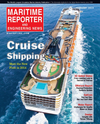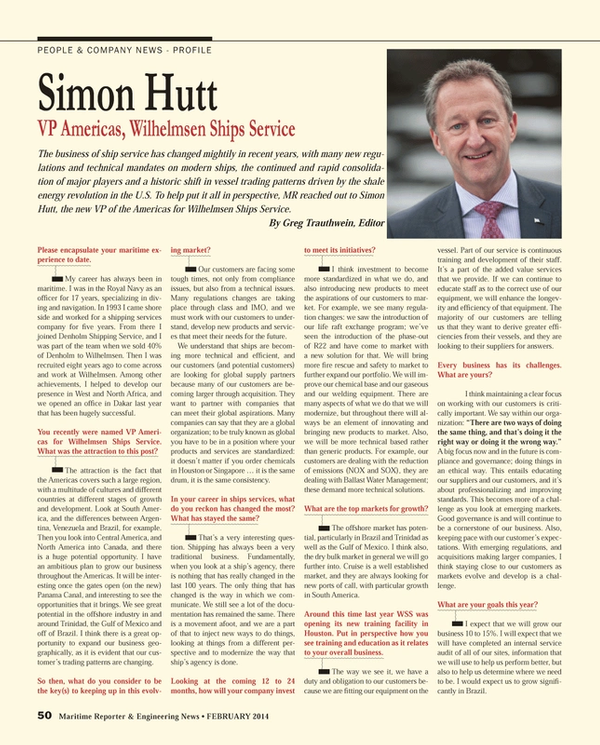
Five Minutes with WSS's Simon Hutt
The business of ship service has changed mightily in recent years, with many new regulations and technical mandates on modern ships, the continued and rapid consolidation of major players and a historic shift in vessel trading patterns driven by the shale energy revolution in the U.S. To help put it all in perspective, MR reached out to Simon Hutt, the new VP of the Americas for Wilhelmsen Ships Service.
Please encapsulate your maritime experience to date.
My career has always been in maritime. I was in the Royal Navy as an officer for 17 years, specializing in diving and navigation. In 1993 I came shore side and worked for a shipping services company for five years. From there I joined Denholm Shipping Service, and I was part of the team when we sold 40% of Denholm to Wilhelmsen. Then I was recruited eight years ago to come across and work at Wilhelmsen. Among other achievements, I helped to develop our presence in West and North Africa, and we opened an office in Dakar last year that has been hugely successful.
You recently were named VP Americas for Wilhelmsen Ships Service. What was the attraction to this post?
The attraction is the fact that the Americas covers such a large region, with a multitude of cultures and different countries at different stages of growth and development. Look at South America, and the differences between Argentina, Venezuela and Brazil, for example. Then you look into Central America, and North America into Canada, and there is a huge potential opportunity. I have an ambitious plan to grow our business throughout the Americas. It will be interesting once the gates open (on the new) Panama Canal, and interesting to see the opportunities that it brings. We see great potential in the offshore industry in and around Trinidad, the Gulf of Mexico and off of Brazil. I think there is a great opportunity to expand our business geographically, as it is evident that our customer’s trading patterns are changing.
So then, what do you consider to be the key(s) to keeping up in this evolving market?
Our customers are facing some tough times, not only from compliance issues, but also from a technical issues. Many regulations changes are taking place through class and IMO, and we must work with our customers to understand, develop new products and services that meet their needs for the future.
We understand that ships are becoming more technical and efficient, and our customers (and potential customers) are looking for global supply partners because many of our customers are becoming larger through acquisition. They want to partner with companies that can meet their global aspirations. Many companies can say that they are a global organization; to be truly known as global you have to be in a position where your products and services are standardized: it doesn’t matter if you order chemicals in Houston or Singapore … it is the same drum, it is the same consistency.
In your career in ships services, what do you reckon has changed the most? What has stayed the same?
That’s a very interesting question. Shipping has always been a very traditional business. Fundamentally, when you look at a ship’s agency, there is nothing that has really changed in the last 100 years. The only thing that has changed is the way in which we communicate. We still see a lot of the documentation has remained the same. There is a movement afoot, and we are a part of that to inject new ways to do things, looking at things from a different perspective and to modernize the way that ship’s agency is done.
Looking at the coming 12-24 months, how will your company invest to meet its initiatives?
I think investment to become more standardized in what we do, and also introducing new products to meet the aspirations of our customers to market. For example, we see many regulation changes: we saw the introduction of our life raft exchange program; we’ve seen the introduction of the phase-out of R22 and have come to market with a new solution for that. We will bring more fire rescue and safety to market to further expand our portfolio. We will improve our chemical base and our gaseous and our welding equipment. There are many aspects of what we do that we will modernize, but throughout there will always be an element of innovating and bringing new products to market. Also, we will be more technical based rather than generic products. For example, our customers are dealing with the reduction of emissions (NOX and SOX), they are dealing with Ballast Water Management; these demand more technical solutions.
What are the top markets for growth?
The offshore market has potential, particularly in Brazil and Trinidad as well as the Gulf of Mexico. I think also, the dry bulk market in general we will go further into. Cruise is a well established market, and they are always looking for new ports of call, with particular growth in South America.
Around this time last year WSS was opening its new training facility in Houston. Put in perspective how you see training and education as it relates to your overall business.
The way we see it, we have a duty and obligation to our customers because we are fitting our equipment on the vessel. Part of our service is continuous training and development of their staff. It’s a part of the added value services that we provide. If we can continue to educate staff as to the correct use of our equipment, we will enhance the longevity and efficiency of that equipment. The majority of our customers are telling us that they want to derive greater efficiencies from their vessels, and they are looking to their suppliers for answers.
Every business has its challenges. What are yours?
I think maintaining a clear focus on working with our customers is critically important. We say within our organization: “There are two ways of doing the same thing, and that’s doing it the right way or doing it the wrong way.” A big focus now and in the future is compliance and governance; doing things in an ethical way. This entails educating our suppliers and our customers, and it’s about professionalizing and improving standards. This becomes more of a challenge as you look at emerging markets. Good governance is and will continue to be a cornerstone of our business. Also, keeping pace with our customer’s expectations. With emerging regulations, and acquisitions making larger companies, I think staying close to our customers as markets evolve and develop is a challenge.
What are your goals this year?
I expect that we will grow our business 10-15%. I will expect that we will have completed an internal service audit of all of our sites, information that we will use to help us perform better, but also to help us determine where we need to be. I would expect us to grow significantly in Brazil.
(As published in the February 2014 edition of Maritime Reporter & Engineering News - www.marinelink.com)
Read Five Minutes with WSS's Simon Hutt in Pdf, Flash or Html5 edition of February 2014 Maritime Reporter
Other stories from February 2014 issue
Content
- Something Old, Something New ... page: 06
- Floating Production Market Forecast page: 10
- The FLNG Market is Poised for Growth page: 12
- Managing BWT Costs and Compliance page: 14
- U.S. Coast Guard Must Assert its Authority page: 16
- Transferring Risk for Long-term Success page: 18
- You Can Run, But You Can’t Hide page: 24
- Cruise Industry Poised for Global Growth page: 26
- MIOX Safe Water Management for Cruise Ships page: 28
- Five Minutes With Tomas Tillberg page: 30
- SS United States: Leading Lady to Damsel in Distress page: 32
- Alfa Laval: Green & Efficient Shipping page: 42
- Oily Wastewater Transformed with WETT-O page: 45
- Siemens System Controls Filter Biofouling page: 46
- New BWM Regs Cometh - Are you ready? page: 46
- Valve Train Halves Idle to Full Load Time page: 48
- Unmanned Ships Now a Reality page: 49
- Five Minutes with WSS's Simon Hutt page: 50
- Hempel Debuts Hempaguard page: 54
- Ecofix Corrosion Repair with Ecoshield Application page: 54
- Envelop Protective Covers page: 55
- GAC Launches Eco-friendly Hull Cleaning Solution page: 56
- CS Unitec Debuts Trelawny Floor Planer page: 56
- New Hatch Sealing Tape page: 57
- New Aluminum Vise Action Compression Latch page: 57
- High Strength, Vibration Resistant Fastener from Huck page: 57
- Gumdrop Debuts Cases for Marine Industry page: 57
- New Handheld Marking System FlyMarker PRO page: 57
- Viking Refits Four NGSCO Vessels with LRRS System page: 57
- DNV GL Debuts New Explosion Hazard Software page: 57
- Handy, Quick Legionella Tests for Cruise Ships page: 58
- AMSOIL Introduces New Arctic Synthetic Grease page: 58
- Clean Marine to Supply EGCS for Tanker Newbuilds page: 58
- Engineered Ventilation Systems Keep Engine Rooms Humming page: 58
- New FARO Laser Scanner Focus3D X 33 page: 58


